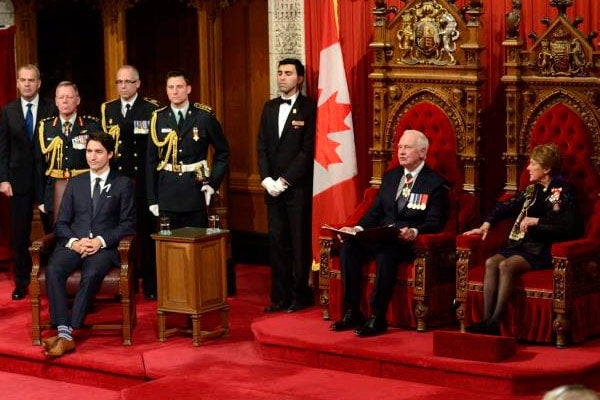
Throne speech: promises to keep, challenges to meet
Published: December 8, 2015
Assistant Professor Theresa Enright was looking for a “concerted national urban strategy” in the federal government’s Speech from the Throne on Nov. 4 but came away disappointed.
Associate Professor Chris Cochrane wasn’t surprised by anything in the speech, and believes that while some promises will be easily kept, others face major challenges.
And Associate Professor Peter Loewen believes the commitment to strengthen Canada’s ties with the United States will be severely tested, especially over President Barack Obama’s rejection of the Keystone pipeline.
“Cities played a key role in the federal election,” said Enright, an assistant professor in the department of political science focusing on urban and regional studies. “The Prime Ministerial candidates focused their campaigns in urban regions and almost all of the major political parties devoted large segments of their respective platforms to urban issues.
“Owing in part to the reorganization of ridings since the last election, cities and suburbs across Canada – and in particular those across the GTA – largely delivered the Liberal victory. It is no surprise, then, that city leaders and city dwellers have been expecting a lot from the new government.”
The speech paid attention to urban issues, Enright said, but offered few substantive details on a national urban strategy. “On the one hand, Prime Minister [Justin] Trudeau confirmed his commitment to infrastructure spending.
“If his multi-billion dollar promises are kept, this investment will undoubtedly benefit cities that are struggling to provide and maintain public transportation, affordable housing and vital social services,” Enright said. “It will also aid cities as they adapt their built environments to deal with the uncertain effects of global warming.
“On the other hand, despite Trudeau’s election pledge of a ‘new deal’ for cities, there was no specific mention in the throne speech of cities, an explicit urban agenda, or stable federal-municipal partnerships.”
(Image below by Jason Krygier-Baum)

“This oversight reflects a familiar reluctance on behalf of recent federal governments to establish a more formal role in urban affairs,” Enright said. “Overall, the priorities outlined in the throne speech offer cities hope, but it still remains to be seen where cities will factor into the government’s new vision for Canada.”
Cochrane, an associate professor of political science, said the speech reiterated promises made during the election campaign: a tax cut for the middle class, a new Canada child benefit and investment in infrastructure. It also committed the government to electoral and Senate reform.
The Liberals will hold an inquiry into missing and murdered indigenous women and girls and seek closer ties with the United States while working diplomatically through the United Nations.
”Some of these items will be easy to implement,” Cochrane said. “The tax cut for middle-income earners and the inquiry into missing and murdered indigenous women will be implemented in very short order.
“The government can also change its posture internationally and re-engage at the United Nations.”
Referendums on electoral reform at the provincial level, Cochrane said, suggest that a consensus on the federal system will be elusive. “Many people want change, but there is little agreement on what that change should look like. The Liberals stand to benefit from a ranked ballot, the NDP from proportional representation, and the Conservatives from the status quo.
“If the electoral rules become politicized along party lines, as I suspect they will, then the government may choose to reconsider its plan of proceeding, unilaterally, without a referendum.”
Loewen is an associate professor of political science and director of the Centre for the Study of the United States at the Munk School of Global Affairs. He was asked whether there are issues that will test the relationship Canada has with the U.S.
“There certainly are, the continued rejection of Keystone first among them,” he said. “There are two things any incoming Prime Minister should know [about relations with the U.S.]. First, 95 per cent of things are easily solved, because we have mutual interests and incentives and a lot of good will. On the other five per cent, friendliness doesn’t go a long way.”
The government committed itself to end the use of government advertising for partisan purposes and allow more free votes in the House of Commons. Loewen was asked how realistic those goals are.
“The first is very realistic and should be applauded,” Loewen said. “The second is much more difficult to achieve. The incentives for leaders to whip votes are very strong and thus hard to overcome. But, on this, I really hope it has a shot.”



